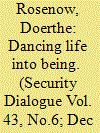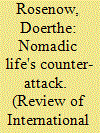| Srl | Item |
| 1 |
ID:
120000


|
|
|
|
|
| Publication |
2013.
|
| Summary/Abstract |
A variety of scholars in critical security studies have recently argued that new modes of neoliberal world order are influenced by the emergence of complexity theory in the sciences, which manifests itself, for example, in the discourse of resilience. By contrast, this article aims to point at the number of governmental discourses and practices in which 'old' understandings of order are persistent. What will be argued is that such a set of practices can be found in the regulation of genetically modified organisms (GMOs), in which the dominant approaches and strategies still rely on an understanding of life that is bound to a more traditional episteme that expresses the desire for predictable management with clearly controllable effects. The article then moves on to discourses of resilience to show how they are equally characterized by this episteme. In unravelling the struggle that exists between 'old' and 'new' epistemes, the article aims to elaborate on the potential of complexity discourses for challenging particular governmental rationales, manifested in both the resilience context and the GMO controversy.
|
|
|
|
|
|
|
|
|
|
|
|
|
|
|
|
| 2 |
ID:
120471


|
|
|
|
|
| Publication |
2013.
|
| Summary/Abstract |
According to opponents of 'neoliberal globalisation' located in the postcolonial realm, multinational corporations are central agents in a structure of global hegemonic rule that leaves little or no space for the postcolonial subject to determine his/her own fate. This argument is contested by a number of scholars, who point out that presupposing a lack of agency on the side of subaltern is yet another way of silencing him/her. But how can his/her 'true' voice be recognised without at the same time disguising existing domination? In this article, it will be argued that one possibility is the development of a different theoretical framework that challenges the taken-for-granted assumption on which the dilemma is based: the existence of the subject and its conscious voice. For this purpose, the article will use Gilles Deleuze's theory of the various expressions and struggles of life. With the help of the analysis of a particular case, Monsanto's introduction of genetically modified cotton into India in 2002, the article will suggest that the multinational company (Monsanto) should not be regarded as yet another neo-colonial oppressor. Instead, it is a war machine that unleashes flows enabling nomadic life assemblages to counter-attack.
|
|
|
|
|
|
|
|
|
|
|
|
|
|
|
|